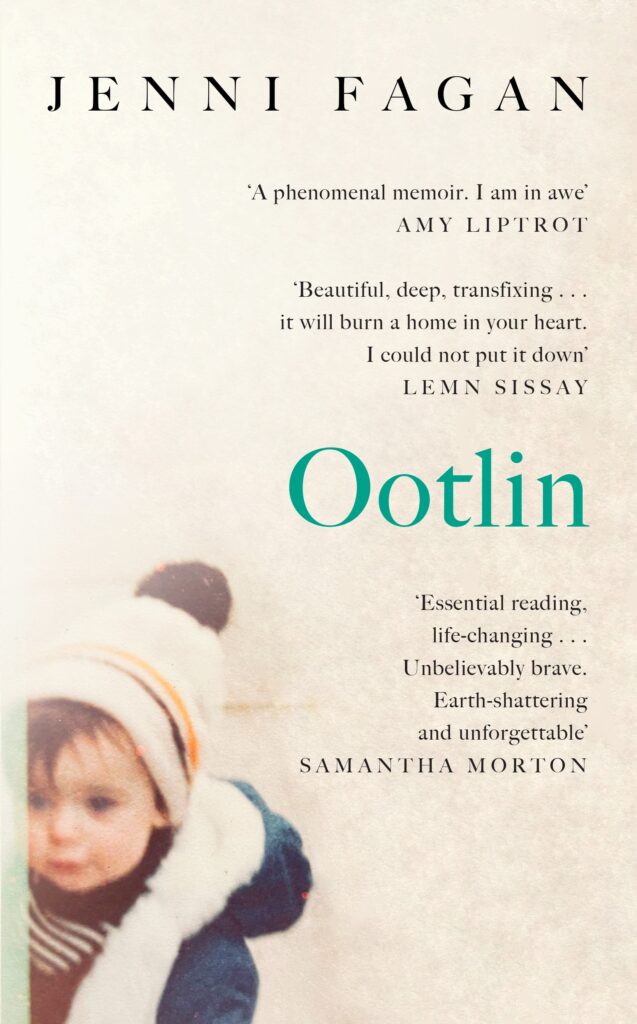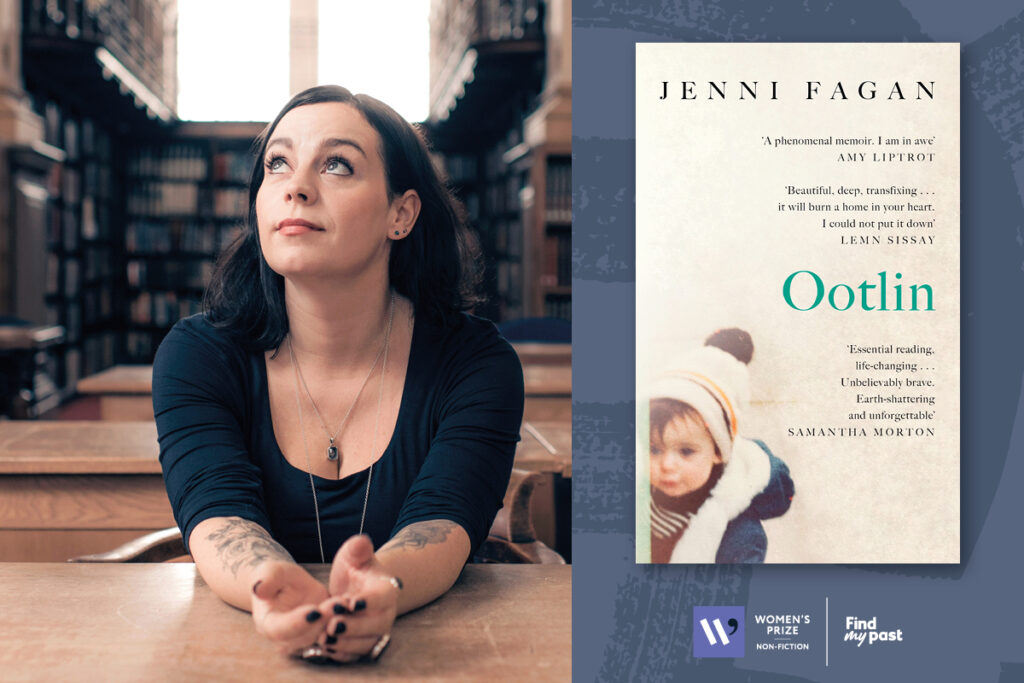Ootlin by Jenni Fagan is about dislocation, ceaselessly moving through all kinds of placements in the broken UK care system.
Longlisted for the 2025 Women’s Prize for Non-Fiction, judge Emma Gannon says the book is: ‘’A moving, enlightening and, at times, harrowing read about growing up in a broken UK care system. The author’s resilience and human spirit shines through on every single page, never shying away from both the brutal and beautiful. A memoir written like poetry. I loved it and cannot stop thinking about it.’
To find out more about the book we spoke to Jenni about her writing, research and current reads.
How would you describe your book to a new reader?
Ootlin is a memoir that is as unusual as the life that inspired it. Jenni Fagan began writing Ootlin as a suicide note when she was 23 years old, the legacy of growing up in the care system with 27 placements, four legal names, two failed adoptions, homelessness and child abuse seemed too overwhelming to survive. Deciding this note seemed really so little to leave for a life, Jenni decided to write the story of her life just one time. On a typewriter borrowed from a neighbour, she wrote the most challenging work and the act of doing so kept her alive. After finishing the manuscript she locked it away and said she would never look at it again, or publish it. Twenty years later, during a global pandemic, after once again thinking she may die, she opened that suitcase, took out that manuscript and revisited it, this time as a critically acclaimed novelist and poet. Ootlin is a lighthouse, a call to question the stories we are all told about who we are, it is the story of someone who survived no matter how overwhelming the odds repeatedly were against her. Beginning her life being born in a psychiatric hospital and handed over to a stranger in a car park on the first day she is born, Ootlin charts the most extraordinary childhood. It is a story Jenni had never told. This is the book you are holding.
Did you have any revelation moments when writing your book? When the narrative and your objectives all fell into place?
I did a great event in HMP Bronzefield where the book group came into chat with me about Ootlin. So many of the women there had similar experiences both in care and often in their own complex childhoods. We had the most ethical, kind, intelligent, engaging and rigorous conversation about what it means to be raised in an institution that tells you overwhelmingly negative things about who you are. It was one of the most insightful and inclusive conversations I have had on this book. One of them women said to me that they would never hold their head down in quite the same way again, that if I could own this kind of history publicly it gives them something that makes them feel more represented in some of their own experiences, they said that it was a book that was literally going to save lives. I learned a lot from the women in HMP Bronzefield that day and their response to this book was a pivotal moment in me truly realising the value of my persistence, in completing a work that I thought was way too much for me to manage personally.
What is the one thing you’d like a reader to take away from reading your book?
Children from the care system — are just kids, they want to be liked, loved, cared for, to be funny, to have a future, to have community, to grow up and achieve the same kinds of dreams as anyone else. There are so many things directed towards children in care, we should never forget, they are just kids growing up in a way that they did not want to.
How did you go about researching your book? What resources did you find the most helpful?
I spent around twenty-four years trying to access my full social work files. They are vital documents planning all sixteen years of my life in care. I only got access to them finally on the day the Freedom of Information Act came in. I had been visiting various departments for decades trying to get access and so they were not too surprised when I rang them at 9am that morning and requested they finally be released in full. The language, the factual records, the documentation, was hugely useful. The first version I wrote at 23 of course was so important as I was so much closer to my life in care back then. I also had thirty years worth of journals, some of those were useful. I did therapy over thirty years and that allowed me to work through a great many of the instances that occur in the book. I also took part in legal endeavours twice, both of which I could not continue as I was too young or unsupported but they allowed me legal exposure, evaluation by court psychologists, who all verified that everything I had gone through was in their professional opinion not only true but likely to impact my health negatively for the rest of my life. The latter I am still trying to work on.
Which female non-fiction author would you say has impacted your work the most?
Maya Angelou is a writer who was hugely influential on me when I discovered her in my teens, she is a writer I have continued to grow with and return to and who has never failed to inspire me.
What is the best piece of writing advice you have ever received?
I like Margaret Atwood‘s advice on writing as a path through a forest and sometimes you just veer off and get lost and that is totally fine, if needs be you just retrace your steps. I am always willing to go in any direction with the work and that is what produces the most interesting literature.
Is there a non-fiction book you recommend all the time? If so, what is it and why do you recommend it?
Man’s Search for Meaning by Viktor E Frankl is an extraordinary book, from his experience in Auschwitz he came to the world expounding the belief that a last core human freedom is to choose our own attitude, in regards to, the things that occur in our lives and the world.
What are you currently reading?
I am currently reading Demonology by King James I because I am writing the film script for my fiction novel Hex. It is a book that documents the North Berwick witch trials and King James I was actively involved and researching Demonology, the witch hunters bible, at the time.









